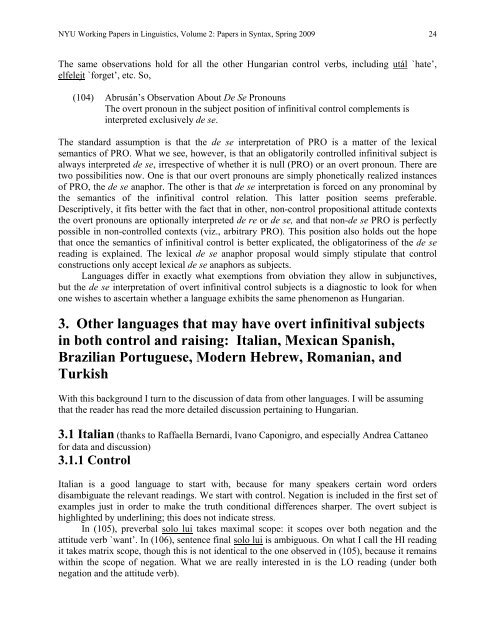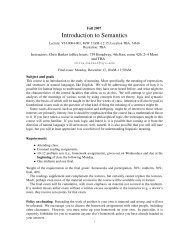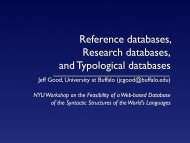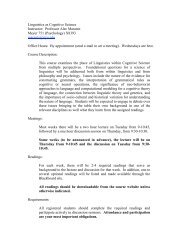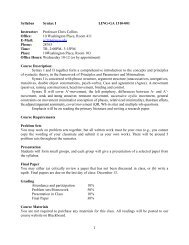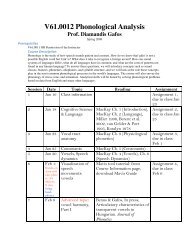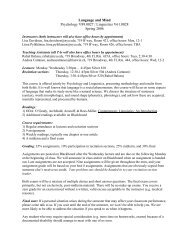Overt Nominative Subjects in Infinitival Complements Cross - NYU ...
Overt Nominative Subjects in Infinitival Complements Cross - NYU ...
Overt Nominative Subjects in Infinitival Complements Cross - NYU ...
Create successful ePaper yourself
Turn your PDF publications into a flip-book with our unique Google optimized e-Paper software.
<strong>NYU</strong> Work<strong>in</strong>g Papers <strong>in</strong> L<strong>in</strong>guistics, Volume 2: Papers <strong>in</strong> Syntax, Spr<strong>in</strong>g 2009 24The same observations hold for all the other Hungarian control verbs, <strong>in</strong>clud<strong>in</strong>g utál `hate’,elfelejt `forget’, etc. So,(104) Abrusán’s Observation About De Se PronounsThe overt pronoun <strong>in</strong> the subject position of <strong>in</strong>f<strong>in</strong>itival control complements is<strong>in</strong>terpreted exclusively de se.The standard assumption is that the de se <strong>in</strong>terpretation of PRO is a matter of the lexicalsemantics of PRO. What we see, however, is that an obligatorily controlled <strong>in</strong>f<strong>in</strong>itival subject isalways <strong>in</strong>terpreted de se, irrespective of whether it is null (PRO) or an overt pronoun. There aretwo possibilities now. One is that our overt pronouns are simply phonetically realized <strong>in</strong>stancesof PRO, the de se anaphor. The other is that de se <strong>in</strong>terpretation is forced on any pronom<strong>in</strong>al bythe semantics of the <strong>in</strong>f<strong>in</strong>itival control relation. This latter position seems preferable.Descriptively, it fits better with the fact that <strong>in</strong> other, non-control propositional attitude contextsthe overt pronouns are optionally <strong>in</strong>terpreted de re or de se, and that non-de se PRO is perfectlypossible <strong>in</strong> non-controlled contexts (viz., arbitrary PRO). This position also holds out the hopethat once the semantics of <strong>in</strong>f<strong>in</strong>itival control is better explicated, the obligator<strong>in</strong>ess of the de seread<strong>in</strong>g is expla<strong>in</strong>ed. The lexical de se anaphor proposal would simply stipulate that controlconstructions only accept lexical de se anaphors as subjects.Languages differ <strong>in</strong> exactly what exemptions from obviation they allow <strong>in</strong> subjunctives,but the de se <strong>in</strong>terpretation of overt <strong>in</strong>f<strong>in</strong>itival control subjects is a diagnostic to look for whenone wishes to ascerta<strong>in</strong> whether a language exhibits the same phenomenon as Hungarian.3. Other languages that may have overt <strong>in</strong>f<strong>in</strong>itival subjects<strong>in</strong> both control and rais<strong>in</strong>g: Italian, Mexican Spanish,Brazilian Portuguese, Modern Hebrew, Romanian, andTurkishWith this background I turn to the discussion of data from other languages. I will be assum<strong>in</strong>gthat the reader has read the more detailed discussion perta<strong>in</strong><strong>in</strong>g to Hungarian.3.1 Italian (thanks to Raffaella Bernardi, Ivano Caponigro, and especially Andrea Cattaneofor data and discussion)3.1.1 ControlItalian is a good language to start with, because for many speakers certa<strong>in</strong> word ordersdisambiguate the relevant read<strong>in</strong>gs. We start with control. Negation is <strong>in</strong>cluded <strong>in</strong> the first set ofexamples just <strong>in</strong> order to make the truth conditional differences sharper. The overt subject ishighlighted by underl<strong>in</strong><strong>in</strong>g; this does not <strong>in</strong>dicate stress.In (105), preverbal solo lui takes maximal scope: it scopes over both negation and theattitude verb `want’. In (106), sentence f<strong>in</strong>al solo lui is ambiguous. On what I call the HI read<strong>in</strong>git takes matrix scope, though this is not identical to the one observed <strong>in</strong> (105), because it rema<strong>in</strong>swith<strong>in</strong> the scope of negation. What we are really <strong>in</strong>terested <strong>in</strong> is the LO read<strong>in</strong>g (under bothnegation and the attitude verb).


